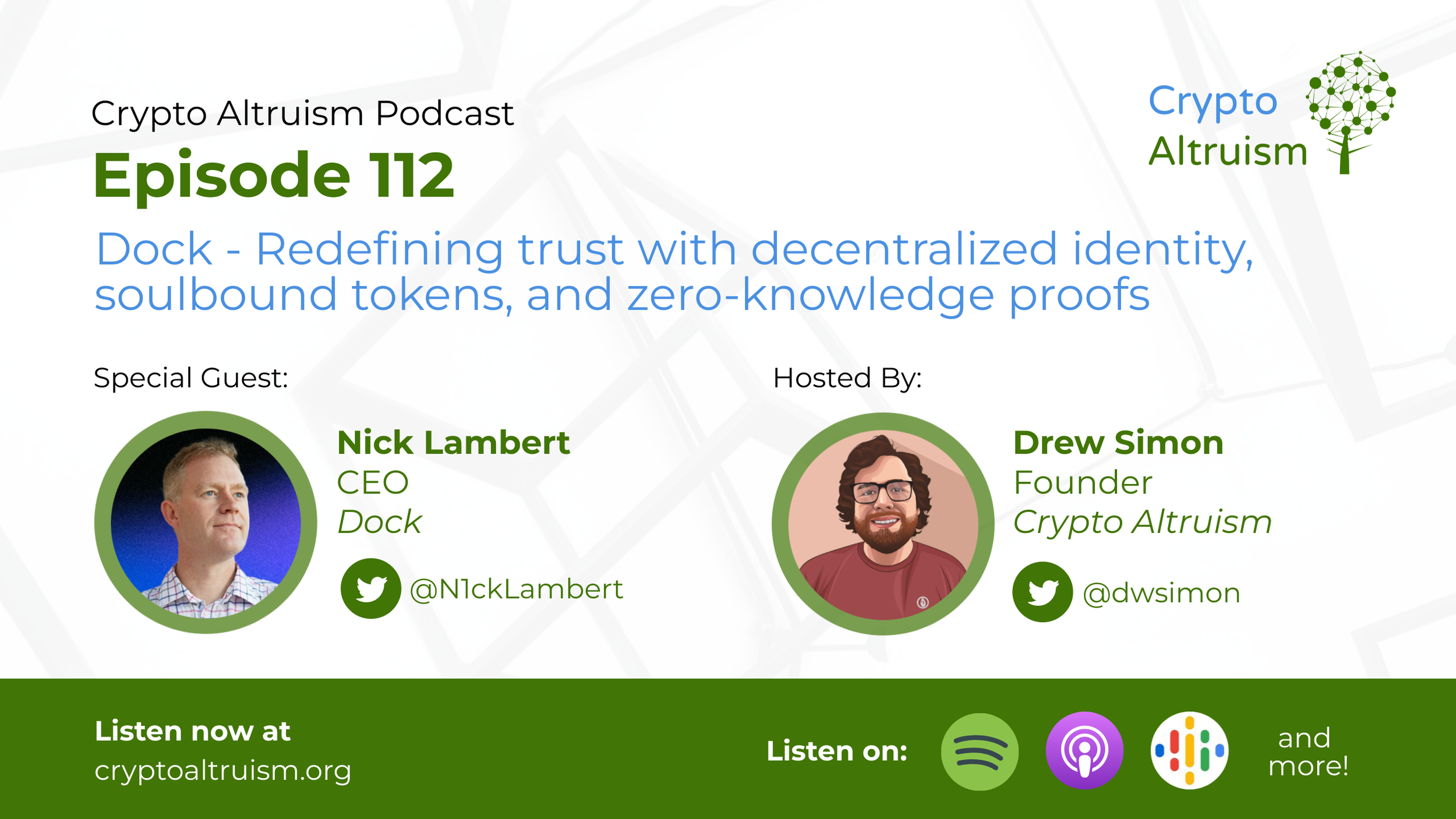Crypto Altruism Podcast Episode 112 - Dock - Redefining trust with decentralized identity, soulbound tokens, and zero-knowledge proofs
In episode 112, we’re excited to welcome Nick Lambert, CEO of Dock, a decentralized identity company that enables organizations to issue, manage, and verify fraud-proof credentials efficiently and securely via blockchain. We discuss how decentralized identity can protect us in our digital world, the innovations of soul-bound tokens and Zero-Knowledge Proofs, how decentralized identity will revolutionize industry in the coming years, and much more.
Three Key Takeaways
At its base level, decentralized credentials can be viewed similarly to a crypto wallet – with each different type of credential (i.e. a University Diploma, proof of age, etc.) taking the form of a “token” within each individual’s decentralized wallet.
Trillions of megabytes of data are created every day, much of it unverified – leading to a host of issues such as fraud, misinformation, scams, and a breakdown in trust online. On-chain credentials can help restore trust by giving individuals piece of mind that the data they are interacting with is authentic and verifiable.
When it comes to decentralized identity, it’s about shifting power away from centralized actors and putting individuals in control of their “stuff” – their credentials, identifying documents, music, data, and everything in between!
Follow Nick and Dock
Episode Time Stamps
02:05 - What was your “Ah hah” moment that got you excited about cryptocurrency and web3 in the beginning?
03:45 - Can you please give listeners a high-level overview of Dock and your organization’s mission?
05:35 - In “explain-it-like-I’m-5 terms” – can you please give listeners an introduction to decentralized identity?
07:55 - What are some of the benefits of a decentralized identity over traditional forms of identification?
10:00 - Why is blockchain needed for decentralized identity? Why can’t it be done without blockchain?
12:25 - How can decentralized identity be used in industry – i.e. education, social impact, financial, and other sectors?
16:15 - How can this solution be applied to the healthcare sector?
19:15 - What are soul-bound tokens and what role do you see them playing 5-10 years in the future?
21:05 - Let’s talk about Zero-Knowledge Proofs. First of all, what are ZK proofs, and how can decentralized identity use them to protect user privacy?
23:25 - How can decentralized identity help protect us in a digital world where so much data is created every day and it’s difficult to determine what is authentic?
27:10 - How can decentralized identity drive financial inclusion for the 1B people worldwide who lack access to proof of identity?
29:00 - Do you have any thoughts on the role biometrics can play in decentralized identity?
30:45 - What’s the best way for listeners to learn more about Dock?
31:45 - To wrap things up, if you could name one thing that excites you most about the social impact potential of web3, what would it be and why?
Send a tip in ETH: cryptoaltruism.eth
Like what you’re reading? Consider contributing to Crypto Altruism so we can continue putting out great content that shines a light on the good being done in the crypto and blockchain community.
DISCLAIMER
While we may discuss specific web3 projects or cryptocurrencies on this podcast, please do not take any of this as investment advice, and please make sure to do your own research on potential investment opportunities, or any opportunity. We host a variety of guests on this podcast with the sole purpose of highlighting the social impact use cases of this technology. That being said, Crypto Altruism does not endorse any of these projects, and we recognize that, since this is an emerging sector, some may be operating in regulatory grey areas, and as such, we cannot confirm their legality in the jurisdictions in which they operate, especially as it pertains to decentralized finance protocols. So, before getting involved with any project, it’s important that you do your own research and confirm the legality of the project. More available HERE.
We may make use of affiliate marketing to provide readers with referrals to high quality and relevant products and services.




